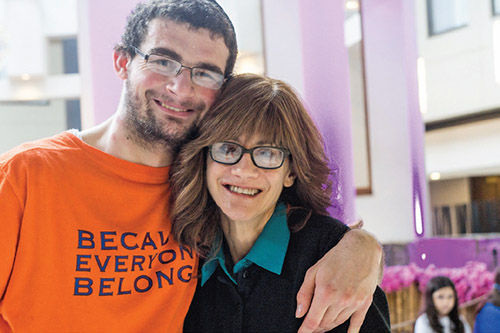



Over 1,000 people from 120 families attended Yachad’s Northeast Family Shabbaton on May 5-7 at Crowne Plaza in Stamford, Connecticut, and 140 volunteer staff helped to make the event a success.
“Yachad takes great pride in being able to host a weekend devoted to families of individuals with disabilities, providing daycare, child care and programming for all children in attendance, allowing the parents and caregivers to focus on the workshops and experts presenting,” said Ahron Rosenthal, director of Yachad New York.
The event had something for everyone in the family. Sessions and networking opportunities for parents, support groups for parents and siblings, programing for individuals with special needs, and full day camp programming for the siblings. Workshops covered a variety of topics, including developmental milestones, social skills vocational readiness, family dynamics, and diagnoses including Autism, Down Syndrome and ADHD. These sessions, led by caring professionals who are leaders in their fields, provided families with vital and timely information.
Families were entertained with a magic show (Magic Mehl) on Saturday night and an inflatable carnival on Sunday.
“Some of the most special experiences I have had are with the parent support groups we run all weekend long,” said Chani Herrmann, New Jersey Yachad director. “The incredible bonds that are formed in a short period of time can lead to long-time friendships and mutual support.”
“We just left the Shabbaton, and my family is on cloud nine,” said one parent. “Tova had an amazing time. Her advisor was terrific, kind, personable and responsible. My daughters and son had a great time at day camp and the carnival. Elissa and I enjoyed not only the sessions, but simply meeting and talking with families we could relate to and who could relate to us. The entire event was well thought out and organized…no small feat. We are so very appreciative of you making this something attainable for us.”
The Shabbaton featured 25 presenters, and the keynote speaker was Dr. David Pelcovitz. Dr. Pelcovitz holds the Gwendolyn and Joseph Straus Chair in Psychology and Education at Yeshiva University’s Azrieli Graduate School, where he also teaches pastoral psychology courses. Dr. Pelcovitz has published and lectured extensively on the psychological impact of trauma and loss, child and adolescent behavior problems, parenting and the impact of divorce and stress on children. His most recent book, which he co-authored with his father, is “Life in the Balance: Torah Perspectives on Positive Psychology.” In his keynote address, he outlined strategies for actively meeting the psychological and social needs of the entire family, promoting healthy communication, and making space and time to balance the needs of the individual with the needs of the entire family.
New for this Shabbaton, Yachad responded to interest from younger families by opening a pre-juniors track for children between the ages of 2 and 7, in addition to the tracks for juniors (ages 8-16), seniors (17-25) and rayim (age 26 and older). Modeled on the programming for juniors, seniors and rayim, the pre-juniors track included a full weekend of programming. Twenty-four young children participated in the new pre-junior program this year, and each child was matched with a one-on-one advisor.
The eighth grade leadership program welcomed 30 students who were nominated by their schools. They participated in sensitivity training, team-building activities and a Q&A with someone who has a sibling with special needs, and enjoyed many social programs with the junior Yachad division. “These students have displayed the passion and commitment to community devotion and attended the shabbaton, learning together about leadership and how to effect change in their own schools and communities,” Rosenthal said. “Yachad looks forward to seeing these young students continue to be involved in the disabilities community and grow into the next generation of leaders.”









